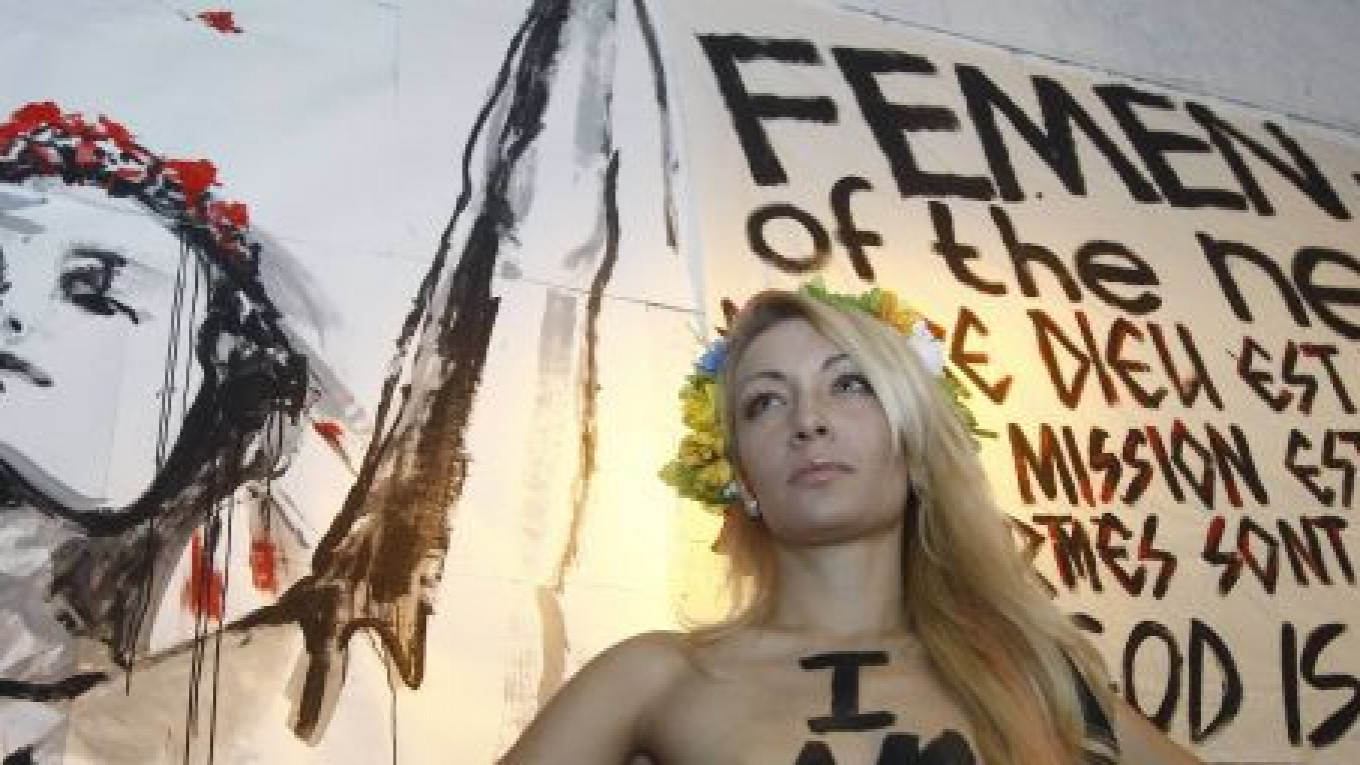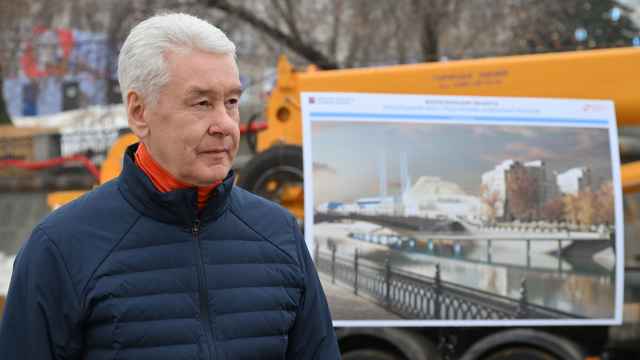PARIS — Femen, the Ukrainian feminist group whose members protest by exposing their breasts, has opened a new global headquarters and "boot camp" in a largely Muslim area of Paris.
To mark the occasion, about 20 French and Ukrainian women with slogans painted across their bare breasts strode through Paris' 18th Arrondissement in a confused scrum of photographers and surprised bystanders.
At their head walked steely-eyed veteran Femen activist Inna Shevchenko, who, fleeing her native Ukraine, now hopes to export the group's "new feminism" to France.
"We're the new face of feminism," she said at the Femen Center, housed in the loft of a struggling cabaret club in the Goutte d'Or neighborhood. "Classical feminism is dead. I think French feminism needs our new feminism."
Shevchenko arrived in France in early September after an abrupt flight from Kiev. The 22-year-old said she left Ukraine after unknown men tried to break down the door of her apartment in the early hours of the morning.
"I heard a knock, and then they tried to break the door," she said. "I grabbed my phone and my passport and climbed out my balcony. I didn't know where I was running to. I never imagined I would leave my motherland. I didn't plan it."
This knock came four days after Shevchenko — topless, naturally — sawed down a 6-meter-high Orthodox cross overlooking Kiev's central square to protest the jailing of three feminist musicians in the band Pussy Riot in Moscow. According to Shevchenko, the cross attack prompted Ukraine's security agencies to put her under surveillance, with up to 20 men sometimes following her.
"There was nothing official. Nothing is done officially in Ukraine," she said. "But this is worse. I think it's better to be arrested."
Facing harassment from the police and Orthodox believers on the street, Shevchenko decided that the time had come to make Femen's long-standing plan for a Parisian training camp a reality.
Inside the Femen Center, beer and champagne bottles lay scattered on the floor, leftovers from a grand-opening party, when France's media descended on the theater and its topless occupants.
Along one wall stretches a towering mural of a naked Ukrainian woman with slogans like "Our mission is protest. Our weapons are our breasts" and "Kill Kirill," a reference to the leader of the Russian Orthodox Church.
The artist responsible, Oksana Shachko, stood nearby in a long fur coat. She and Shevchenko are among the four core Ukrainian members who work full time and are paid a salary by the group. The other two members remain in Ukraine.
"It's awful. They talk about us like the Spice Girls," said one French activist as she scanned French newspaper reports about Femen's activities.
About 30 French women have joined the Ukrainians, including 29-year-old Eloise Bouton, who describes herself as the most active of Femen's French members and was arrested in London during the group's protest of the recent Olympic Games. Alongside the Ukrainians, Bouton hopes to help train new recruits to participate in Femen's theatrical protests.
"It's to get them ready," Bouton said, sitting near a punching bag. "There will be physical training: how to run, how to fall down. Also emotional, psychological training: how to act under stress, how to act in custody. The Ukrainians are really used to this."
In addition, Femen intends to offer philosophical discussions and language classes in French, English and Russian.
"We will also rehearse," Bouton said. "There are scenarios, almost scripts. People play the role of police, of the press. One of our activists used to be a clown, so she's going to teach us how to give a strong performance."
Bouton said it was Femen's novel, physical approach that attracted her.
"It was the first time I'd seen feminist activists using their minds and their bodies," she said.
France has long been known as the home of feminine liberation and more intellectualized forms of feminist protest, embodied by the 20th-century writer Simone de Beauvoir. But it is precisely this tradition of intellectual feminism that Shevchenko believes now needs rejuvenation through Femen's flashy methods.
"Classical feminism is a dialogue for the select," she said. "It's not feminism; it's egoism. Our feminism is for all. We're street people. Real politics is on the street."
Shevchenko envisages Femen as a global movement — Femen-inspired cells are already active from Morocco to Brazil — but insists that the group remains fundamentally Ukrainian.
"We're not French," she said. "Our feminism is different from traditional feminism because we created it ourselves. We do what we want and call it feminism, and the world reacted, which means it's right."
Femen's new home, the Lavoir Moderne Parisien, is appropriately also engaged in a struggle with the authorities. The alternative theater, featured in Emile Zola's 1877 novel "L'Assommoir," has been mired in a prolonged legal battle with the Paris Mayor's Office after the building's owner ordered the venue to make way for apartments. The installation of a "sextremist boot camp" upstairs is unlikely to simplify matters.
But the choice of the Lavoir as a base is controversial for another reason as well: It's in Goutte d'Or, which has had a reputation as a rough neighborhood since Zola described the poverty and endemic alcoholism of its white, working-class inhabitants in the 19th century.
Today, the area is predominantly African. Chaotic street markets selling exotic vegetables fill the pretty streets. It is also well-known for crack cocaine, and police carry out frequent raids.
But the atmosphere is lively, hectic and friendly, a melting pot on the edge of Montmartre in northern Paris. A good place perhaps for a Ukrainian-led multinational group of militant nudists.
But Goutte d'Or is also home to one of Paris' most concentrated Muslim communities. Algerians make up the largest national group in the quarter, and a mosque and Islamic cultural center sit on the same street as the Femen Center. Femen's views on women are at odds with even most moderate forms of Islam, and their methods are likely to provoke objections.
The group's appearance in the neighborhood attracted special attention from the French media because it coincided with an international outcry over the release of cartoons mocking Islam and its prophet in the French satiric magazine Charlie Hebdo.
Under the circumstances, Femen's decision to open in a predominantly Muslim area looked like a deliberate provocation. The group stoutly denies this.
"Everyone thought we planned this, but it's a coincidence," Bouton said.
Shevchenko agreed: "We came where we had opportunities. Lavoir Moderne offered, and we have no money. We have no sponsors."
But both women acknowledged that Islam was likely to become a target of Femen sooner or later, and they defended Charlie Hebdo's decision to publish.
At a march on Sept. 18, one activist's breasts were painted with the words "Muslim women, let's get naked." Bouton wore the words "Our God is a woman."
"Islam is a target," Bouton said. "But it's not our target. We don't have one enemy worse than another. It's very important to focus on women. If [a movement's goal is] just to destroy Islam, it's not interesting to me."
Shevchenko is less ambiguous.
"Religions aren't right. Religion is not peaceful," she said. "Every religion has an aggressive way of understanding the world."
Locals living near the Femen Center seem more bemused than outraged by their new neighbors.
"If you go to the south, you see women at the beach with their breasts exposed," said a local bar owner. "They're seeking freedom, I suppose."
Others, though, were more roused by the group's first action.
"What does it achieve, going naked?" said Dieng Ibrahima, a 35-year-old electrician. "I think it's wrong, but no, I won't do anything about it. Islam is a personal thing for me. Islam is peace."
Shevchenko, meanwhile, insisted that Femen's actions, including her felling of the cross in Kiev, are motivated by a desire to provoke thought, not hate.
"Our goal is to teach women to be active," she said. "I've been in countries where women lack understanding of how to act without a man. In my country, women don't know that."
Related articles:
A Message from The Moscow Times:
Dear readers,
We are facing unprecedented challenges. Russia's Prosecutor General's Office has designated The Moscow Times as an "undesirable" organization, criminalizing our work and putting our staff at risk of prosecution. This follows our earlier unjust labeling as a "foreign agent."
These actions are direct attempts to silence independent journalism in Russia. The authorities claim our work "discredits the decisions of the Russian leadership." We see things differently: we strive to provide accurate, unbiased reporting on Russia.
We, the journalists of The Moscow Times, refuse to be silenced. But to continue our work, we need your help.
Your support, no matter how small, makes a world of difference. If you can, please support us monthly starting from just $2. It's quick to set up, and every contribution makes a significant impact.
By supporting The Moscow Times, you're defending open, independent journalism in the face of repression. Thank you for standing with us.
Remind me later.






